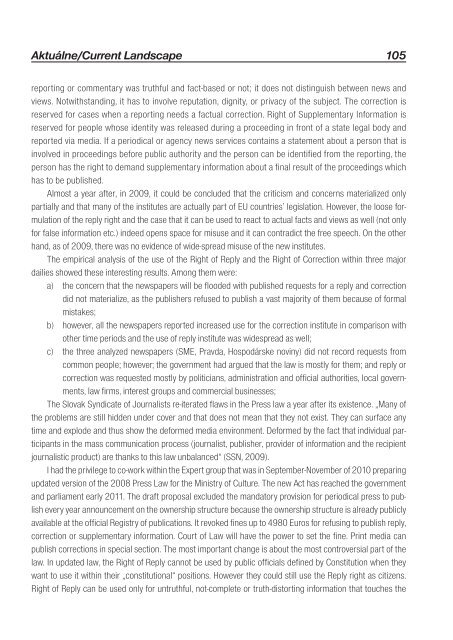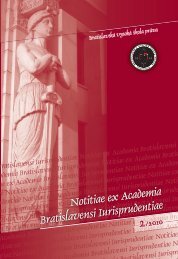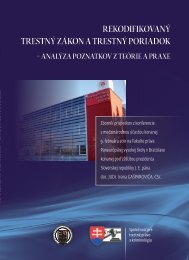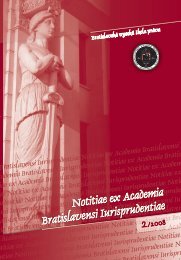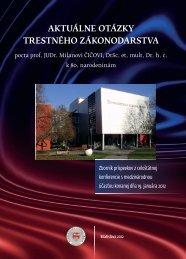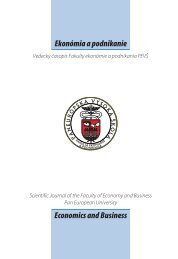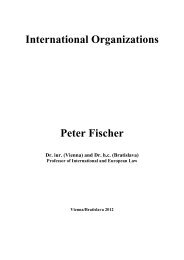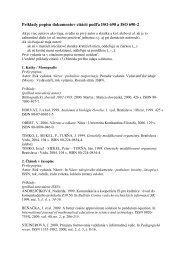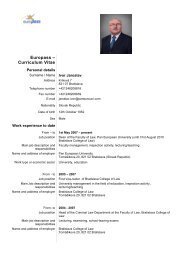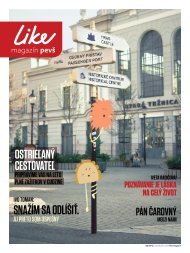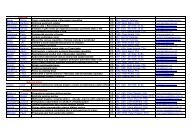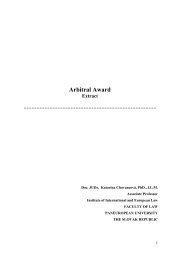ÄÃslo 1/2013 - Paneurópska vysoká Å¡kola
ÄÃslo 1/2013 - Paneurópska vysoká Å¡kola
ÄÃslo 1/2013 - Paneurópska vysoká Å¡kola
You also want an ePaper? Increase the reach of your titles
YUMPU automatically turns print PDFs into web optimized ePapers that Google loves.
Aktuálne/Current Landscape 105<br />
reporting or commentary was truthful and fact-based or not; it does not distinguish between news and<br />
views. Notwithstanding, it has to involve reputation, dignity, or privacy of the subject. The correction is<br />
reserved for cases when a reporting needs a factual correction. Right of Supplementary Information is<br />
reserved for people whose identity was released during a proceeding in front of a state legal body and<br />
reported via media. If a periodical or agency news services contains a statement about a person that is<br />
involved in proceedings before public authority and the person can be identified from the reporting, the<br />
person has the right to demand supplementary information about a final result of the proceedings which<br />
has to be published.<br />
Almost a year after, in 2009, it could be concluded that the criticism and concerns materialized only<br />
partially and that many of the institutes are actually part of EU countries’ legislation. However, the loose formulation<br />
of the reply right and the case that it can be used to react to actual facts and views as well (not only<br />
for false information etc.) indeed opens space for misuse and it can contradict the free speech. On the other<br />
hand, as of 2009, there was no evidence of wide-spread misuse of the new institutes.<br />
The empirical analysis of the use of the Right of Reply and the Right of Correction within three major<br />
dailies showed these interesting results. Among them were:<br />
a) the concern that the newspapers will be flooded with published requests for a reply and correction<br />
did not materialize, as the publishers refused to publish a vast majority of them because of formal<br />
mistakes;<br />
b) however, all the newspapers reported increased use for the correction institute in comparison with<br />
other time periods and the use of reply institute was widespread as well;<br />
c) the three analyzed newspapers (SME, Pravda, Hospodárske noviny) did not record requests from<br />
common people; however; the government had argued that the law is mostly for them; and reply or<br />
correction was requested mostly by politicians, administration and official authorities, local governments,<br />
law firms, interest groups and commercial businesses;<br />
The Slovak Syndicate of Journalists re-iterated flaws in the Press law a year after its existence. „Many of<br />
the problems are still hidden under cover and that does not mean that they not exist. They can surface any<br />
time and explode and thus show the deformed media environment. Deformed by the fact that individual participants<br />
in the mass communication process (journalist, publisher, provider of information and the recipient<br />
journalistic product) are thanks to this law unbalanced“ (SSN, 2009).<br />
I had the privilege to co-work within the Expert group that was in September-November of 2010 preparing<br />
updated version of the 2008 Press Law for the Ministry of Culture. The new Act has reached the government<br />
and parliament early 2011. The draft proposal excluded the mandatory provision for periodical press to publish<br />
every year announcement on the ownership structure because the ownership structure is already publicly<br />
available at the official Registry of publications. It revoked fines up to 4980 Euros for refusing to publish reply,<br />
correction or supplementary information. Court of Law will have the power to set the fine. Print media can<br />
publish corrections in special section. The most important change is about the most controversial part of the<br />
law. In updated law, the Right of Reply cannot be used by public officials defined by Constitution when they<br />
want to use it within their „constitutional“ positions. However they could still use the Reply right as citizens.<br />
Right of Reply can be used only for untruthful, not-complete or truth-distorting information that touches the<br />
GMJ Book.indb 105 21.1.<strong>2013</strong> 9:44


